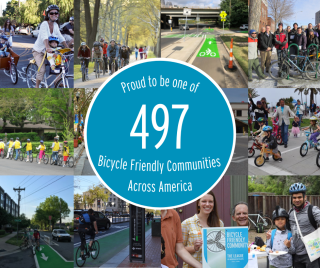Salem Named a Bicycle-Friendly City

Today, the League of American Bicyclists honored the efforts of the City of Salem to build better places for people to bike with its bronze-level Bicycle Friendly Community (BFC) award. Salem joins 497 communities across the country, and 14 others in Massachusetts, in the movement for safer streets and better bicycling for everyone.
The League of American Bicyclists’ Bicycle Friendly America program sets the standard for how communities build and benchmark progress toward making biking better. This round of awards includes 57 new and renewing awardees, joining a total of 497 current Bicycle Friendly Communities in all 50 states and the District of Columbia. The bronze BFC award recognizes Salem’s commitment to improving conditions for people who bike through investments in bike education programs, regular bike events that promote and encourage people to choose biking, pro-bike policies, and bike infrastructure.
The City established its Bicycling Advisory Committee in 2006 and completed Bike Master Plans in 2010 and 2018 to guide the development of infrastructure, programs, and policies to support bicycling within the community.
“I’m proud that Salem is making bicycling a safe, convenient, and enjoyable travel option to help reduce vehicle traffic and congestion, strengthen public health, and improve our environment by reducing emissions and lessening our local contribution to the climate crisis,” said Mayor Kim Driscoll. “I want to thank the Bicycling Advisory Committee, the City’s Traffic & Parking and Planning departments staff, and former transportation intern Noah Gordon, for all of their work to prepare the application for this award, and their ongoing efforts to make Salem more bike-friendly. This designation is a recognition of our City’s work to become a ‘car choice’ community, where driving is just one option for residents, employees, students, and visitors to get to their destination.”
Several recent projects expand the reach and connectivity of the off-street path network through Salem’s neighborhoods. These include the Harbor Connector Path between Collins Cove and Derby Street, the Mayor Anthony Salvo Multiuse Path between downtown and South Salem (and, soon, all the way to Marblehead), and the new Bridge Street path connecting the Mayor Jean Levesque Community Life Center and surrounding neighborhood to downtown via the Leslie’s Retreat Park path. These paths are open to not only cyclists, but also pedestrians, joggers, in-line skaters, and people using wheelchairs and mobility scooters.
Salem has maintained a bike share program for the past ten years, launching the “Salem Spins” program in 2011 and contracting in 2017 with bike share operator Zagster. This July, the City joined Bluebikes, Metro Boston’s regional bike share program, and plans to deploy several more Bluebikes stations throughout the community over the coming months.
Salem’s expansion of biking infrastructure supports the community’s goals to reduce carbon emissions and increase climate resiliency. Transportation accounts for nearly half of Salem’s energy use and bicycling is a zero-emission alternative to motor vehicles. Furthermore, the City is undertaking projects to make its path network resilient. In partnership with Salem Sound Coastwatch, the City recently built a living shoreline at Collins Cove to protect the Peter Tracy Path and surrounding homes from coastal storm surge and wave action. The Commonwealth’s Executive Office of Energy & Environmental Affairs recently awarded a Municipal Vulnerability Preparedness grant for the Cities of Salem and Peabody to evaluate climate adaptation strategies to incorporate into a planned multiuse path within the Harmony Grove Road area of the North River corridor.
More than 850 communities have applied for recognition by the Bicycle Friendly Community program, which provides a roadmap to making biking better for communities of all shapes and sizes. While the award process considers very visible elements such as bike infrastructure, other essential elements include efforts around adult and youth bike education, encouragement through events like Bike to Work Day, evaluation mechanisms, and enforcement all through the lens of equity. The rigorous application process is an educational tool in itself and includes an opportunity for local bicyclists and active transportation advocates to provide input on their experiences and perceptions of bicycling in their community. In addition, the League issues a detailed report card to applicants and the City of Salem will use this evaluation to inform its continued work to become an even more bike friendly city into the future.
To learn more about the BFC program, visit bikeleague.org/community and to find out more about Salem's Bicycling Advisory Committee, visit salem.com/bicycling-advisory-committee.

